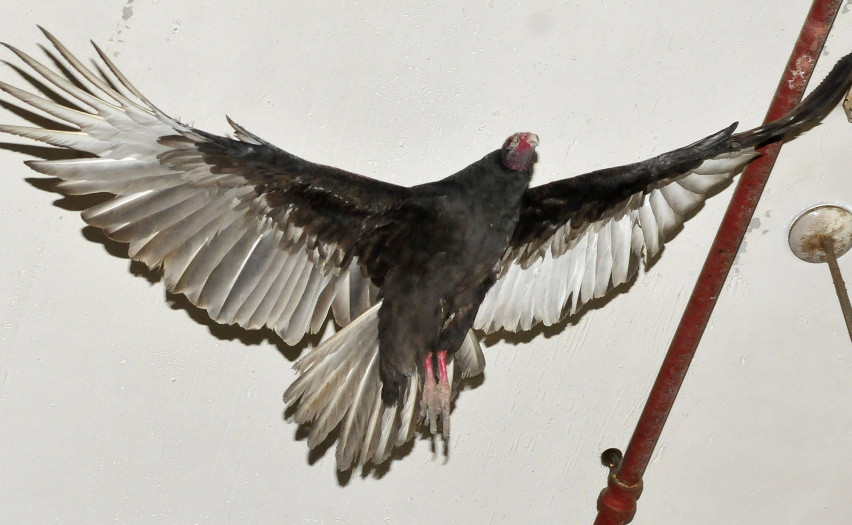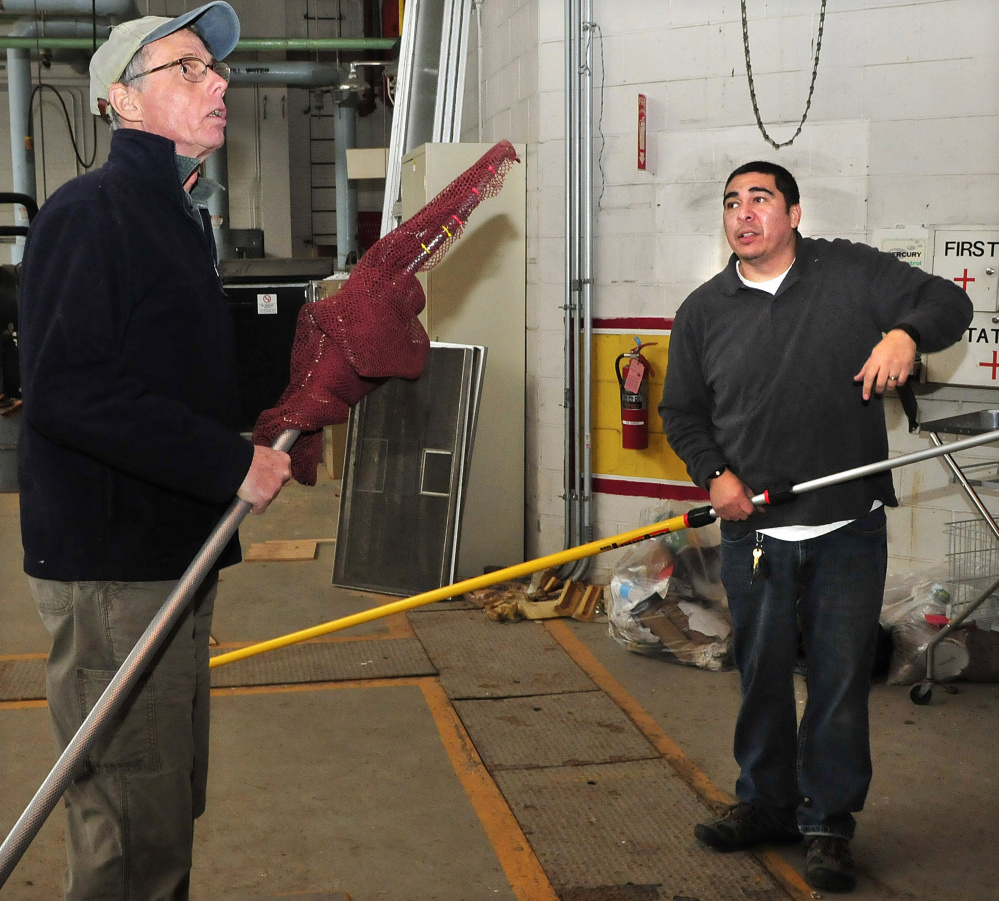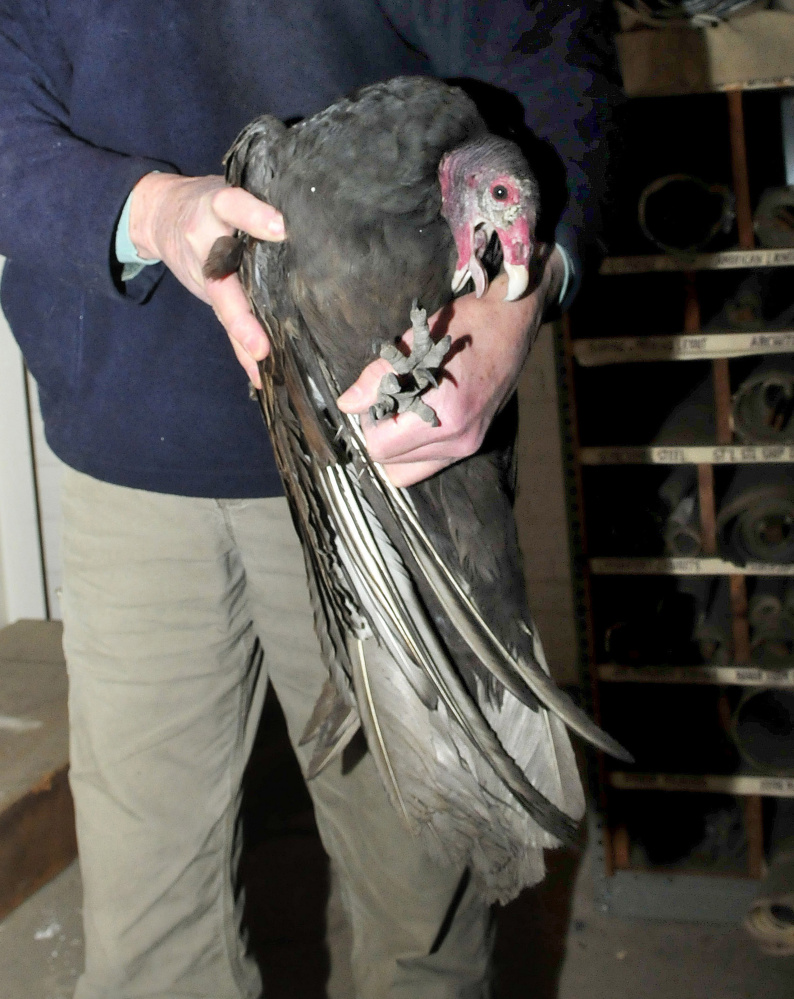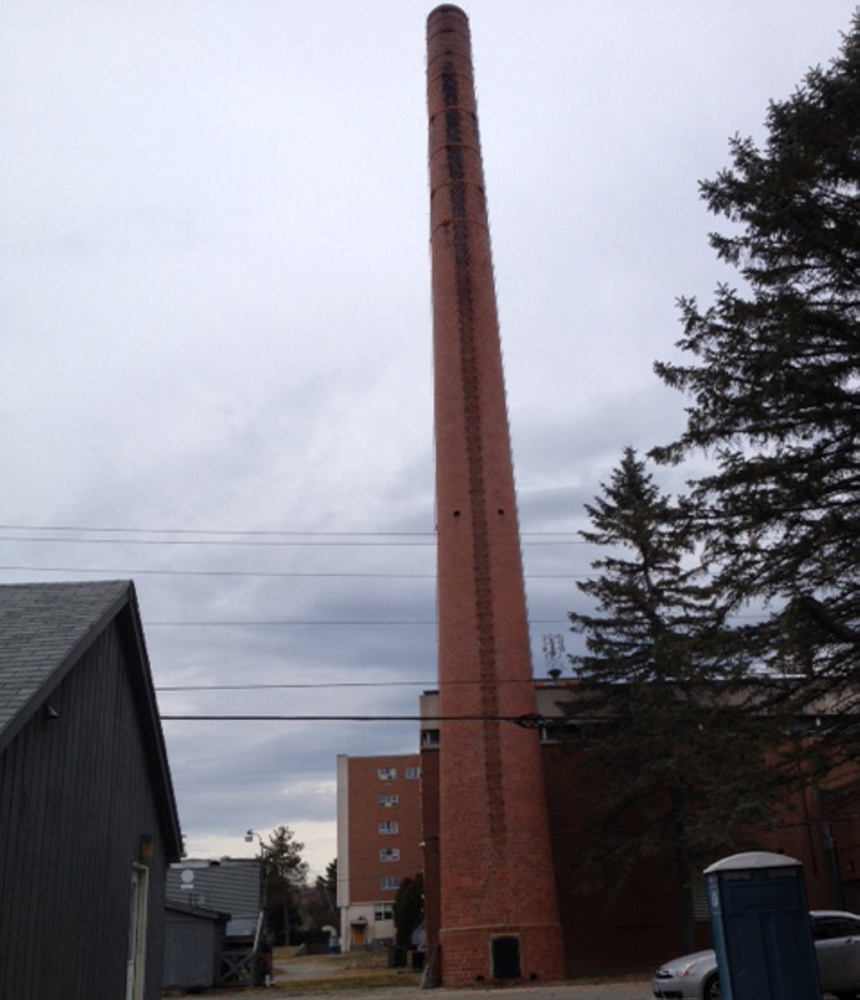WATERVILLE — An agitated turkey vulture that had been trapped in the boiler room at the former Seton Hospital for days was captured Thursday after a two-hour standoff with the city’s animal control officer, Chris Martinez.
“He’s a lot smarter than I am,” Martinez said as he tried to capture the vulture with a 23-foot painter’s pole and attached net, only to watch it repeatedly fly off to another corner of the room.
The turkey vulture, with a six-foot wing span, apparently got into the boiler room via a brick smokestack that is connected to vents inside the room at the former hospital on Chase Avenue. The vents were once connected to steam boilers.
Martinez was called to the building late Thursday morning by Cullen Fletcher, who manages the property for owner Kevin Mattson, who plans to turn the building into apartments and offices.
Fletcher said the vulture had been in the boiler room, which has 30-foot-high ceilings, for a couple of days.
The vulture, black with a red head and gray under its wings, flew to perches on a maze of pipes near the ceiling and balconies each time Martinez tried to capture it with the pole and net.
After about an hour and a half, Martinez called Avian Haven, a wild bird rehabilitation center in Freedom, and Terry Heitz from Avian arrived and helped capture it.
Heitz was positioned on one side of a balcony and Martinez was on the other end as they worked to shoo the bird back and forth until Martinez caught it with the net and brought it to the floor. Heitz helped to put the bird into a pet carrier and took it to Avian Haven.
STRESSFUL FOR THE BIRD
No broken bones or injuries were found in a preliminary evaluation, according to Avian co-founders Diane Winn and Mark Payne. They planned to keep an eye on the bird for the remainder of the day, and if all went well, it would be placed in an outdoor flight cage Friday. In a few days, it may be released, they said.
“He seems pretty good right now — it’s been pretty stressful for the bird,” Payne said.
“This time of year it’s not uncommon for birds to come down a chimney,” he said.
Fletcher said he has seen turkey vultures perching on the smokestack as well as on a tall antenna on the building’s roof. The building is closed with no heat or running water.
Payne said the vulture may have been scouting out nesting places when it made its way down the smokestack. Turkey vultures nest in abandoned buildings, caves or other types of rock shelters, he said. The birds are just now migrating to Maine for the season from farther south on the Atlantic coast, he said.
Payne said vultures may also be in the area because they have a good sense of smell, whereas a lot of other birds don’t, and may be attracted to the odor of natural gas, which smells like rotting flesh.
Martinez said vultures roost together in trees and when they’re not roosting, they are flying or feasting on carrion. He said it is unusual to find a vulture inside a building.
BIRD CARE
Martinez, who is animal control officer for several towns and a police officer for the city of Hallowell, worked at the Los Angeles Zoo in the 1990s, where he became familiar with large birds.
“I worked right next to the condor pen, and I worked with a lot of those types of birds then,” he said.
Martinez notified the Maine Warden Service about the vulture.
“When it comes to wildlife, they need to know what’s going on,” he said.
Martinez typically works with animals such as cats and dogs, but he had another big bird encounter a couple of years ago when he rescued an osprey in Randolph that had been fishing and got entangled in a fishing line with a lure.
“The string was long enough that it actually started to tangle in his wings,” Martinez said. “At a certain point over land, he couldn’t flap his wings open and fell from the sky into a guy’s backyard.
“The guy called and I went out there and got the bird and sat in the back of my truck and untangled it.”
Avian Haven is a nonprofit organization that has treated nearly 15,000 birds of more than 100 species, according to its website.
Amy Calder — 861-9247
Twitter: @AmyCalder17
Send questions/comments to the editors.







Success. Please wait for the page to reload. If the page does not reload within 5 seconds, please refresh the page.
Enter your email and password to access comments.
Hi, to comment on stories you must . This profile is in addition to your subscription and website login.
Already have a commenting profile? .
Invalid username/password.
Please check your email to confirm and complete your registration.
Only subscribers are eligible to post comments. Please subscribe or login first for digital access. Here’s why.
Use the form below to reset your password. When you've submitted your account email, we will send an email with a reset code.